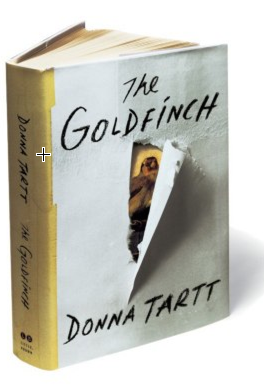Book Review: The Goldfinch, by Donna Tartt
 I don't often review fiction on this site because I made a decision long ago to brand this site as being specifically about tech comm. But a couple of recent posts by my blogging friends (Neil Kaplan and Sarah Maddox) remind me that it's good to show more than one side of a person. I wouldn't want you to think that my sole interest and passion in life is technical writing. I have a lot of other interests and thoughts. I would hope that regular readers of my blog might welcome some "off topic" posts that show more sides of me.
I don't often review fiction on this site because I made a decision long ago to brand this site as being specifically about tech comm. But a couple of recent posts by my blogging friends (Neil Kaplan and Sarah Maddox) remind me that it's good to show more than one side of a person. I wouldn't want you to think that my sole interest and passion in life is technical writing. I have a lot of other interests and thoughts. I would hope that regular readers of my blog might welcome some "off topic" posts that show more sides of me.
When I have the time to sit down and read, I usually read technical books from safaribooksonline. But when I am riding my bike, walking, cleaning, swimming, or traveling, I almost always listen to audio books from Audible, mostly fiction.
Recently, I finished listening to The Goldfinch, by Donna Tartt, ready by David Pittu. It's one of the best books I've listened to this year. Admittedly, I usually choose fiction books by popularity. This book won the Pulitzer Prize and had 7,365 ratings on Audible. The plot description doesn't look that interesting, but don't let that stop you. The best books sometimes have the most indescribable plots.
Basically, this is a coming-of-age story about a 13-year-old boy, Theo Decker, whose mother is killed by a terrorist bomb at a museum. During Theo's escape from the wreckage, a dying man gives him a painting of The Goldfinch, by Carel Fabritius in 1654, and urges him to save it. Rather than returning it immediately to museum curators, the boy hangs on to the painting for the next 7 years. The painting comes to symbolize the boy's connection to his mother and is the constantly interwoven thread throughout the bildungsroman.
With his mother dead, the boy is shipped out to Las Vegas to live with his gambling father. There he meets a larger-than-life character, Boris, who introduces the protagonist to a wild and reckless life in which drug consumption, alcohol, living freely and without planning for the future is the norm. Theo eventually becomes an antiques dealer, swindles naive clients, and becomes business partners with an older man -- one who cared for him after the initial bomb explosion, and who loves to restore old furniture (as well as restore broken and lost people like Theo).
At 784 pages, the book is somewhat long, and I know my description of the plot doesn't present an appealing story. But I'm telling you, this book, narrated in first person, has a quality of authenticity and earnestness to it that really connects with readers. Tartt manages to develop the narrator into an appealing young boy/man trying to find his way in the world, who unfortunately makes one bad decision after another. Theo finally hits bottom and tries to end his life after attempt to retrieve the lost Goldfinch painting in Europe goes awry. But Boris saves the day and Theo gets back on track, and you find out that sometimes the good only comes about through the bad, and so forth.
I'm sure this would make an excellent read as well, but it was fantastic to listen to David Pittu's narrating voice, particularly with the Boris character, whose accent was a mix of Ukranian, Russian, and a few other countries. Pittu is one of those narrators who can create a voice for every new character, and can slip in and out of the voice so naturally it seems he must have a whole crew of voice actors.
You can download The Goldfinch from Audible here.


